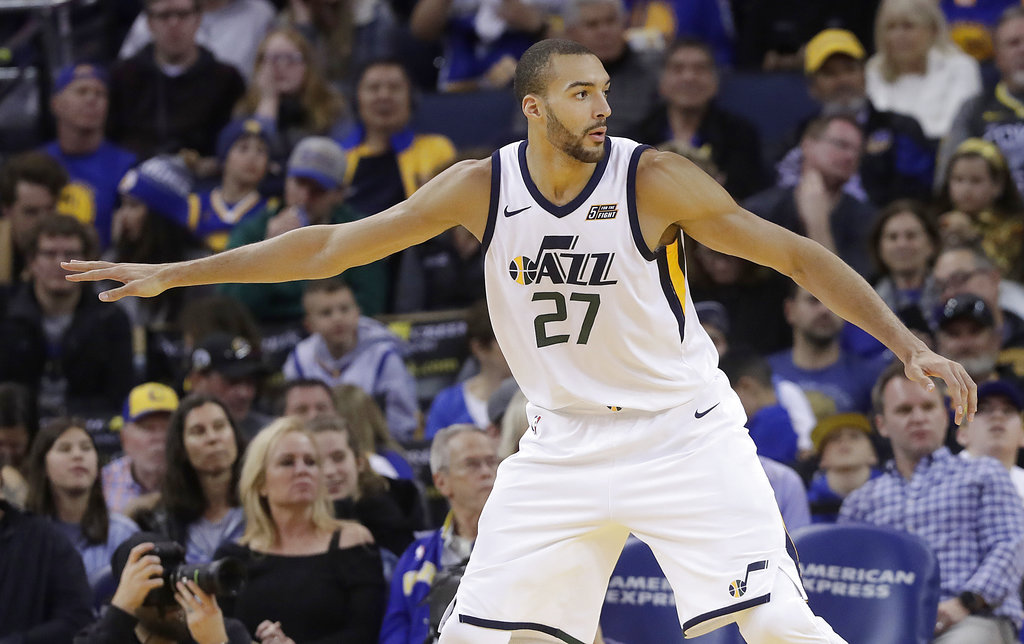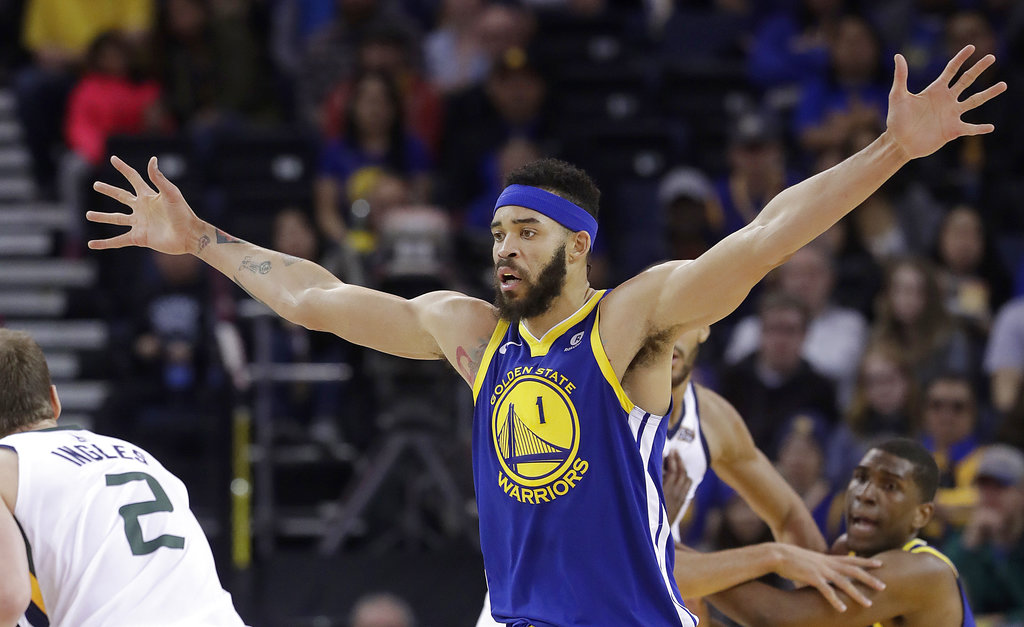NBA teams paying closer attention to players’ wingspan

This March 25, 2018, photo shows Utah Jazz center Rudy Gobert in action during an NBA basketball game against the Golden State Warriors in Oakland, Calif. From executives and scouts to coaches and analytics types, teams are paying closer attention to wingspan when considering players _ especially with what long arms can mean making a defensive impact. (AP Photo/Jeff Chiu)
OAKLAND, Calif. — Not until Nate McMillan began being fitted for custom-made suits a few years into his NBA career three decades ago did he understand just how far his arms reached.
When Bill Walton dominated at UCLA in the 1970s, no one ever measured his wingspan — from fingertips to fingertips and arms outstretched.
Neither knew their wingspans then, and they still don’t. That is not the case for young players.
“Yeah, I found that out once I bought my first suit,” the 6-foot-5 McMillan, a 12-year pro now coaching the Pacers, said with a chuckle, realizing his arms stretched more than 3 feet each.
Once limited to descriptions of birds, wingspan has become one of the most important measurements for basketball prospects over the past decade. Coaches marvel at players with long arms, figuring they will more easily grab rebounds, block shots, steal passes and shoot over defenders.
The average man has a wingspan about 2 inches more than his height. But several NBA players pop off the chart because of their long arms.
It’s no coincidence that Jazz center Rudy Gobert, who stands 7-1 and led the NBA in blocks last season, has the longest wingspan in the league at 7 feet, 9 inches.
The NBA playoffs begin Saturday, and an extra inch of reach can lead to a blocked shot or steal that might alter a series or a season.
Milwaukee Bucks star Giannis Antetokounmpo is nicknamed the “Greek Freak” in part because he stands 6-11 with a 7-3 wingspan and giant hands. The explosive Russell Westbrook is 6-3, with a wingspan of 6-8, which helps him be one of the best rebounding guards in history.
“Every asset that a player has might make up for something else. If somebody’s short, hopefully they’re quick. The wingspan sure helps a lot of people,” Spurs coach Gregg Popovich said . “You look at size of hands, wingspans. Look at John Stockton’s arms or Avery Johnson’s arms and they’re very long, and their hands are very big. They can control the basketball, they can do things with it.

In this March 25, 2018, photo, Golden State Warriors center JaVale McGee (1) guards Utah Jazz forward Joe Ingles during an NBA basketball game in Oakland, Calif. From executives and scouts to coaches and analytics types, teams are paying closer attention to wingspan when considering players _ especially with what long arms can mean making a defensive impact. (AP Photo/Jeff Chiu)
“A wingspan always helps people, whether it’s blocking shots or deflections on defense.”
In recent seasons, Warriors high-scoring All-Star Kevin Durant has become more determined to use his 7-5 wingspan to make more of an impact on defense.
Durant, the reigning NBA Finals MVP , is quick to point out that his length allows him to make up for other areas, including being far leaner than most NBA players.
“You make up a lot of ground. I’m not as fast laterally, I’m not as athletic, I’m not as quick as guys up and down but I think I make up for it with my length,” said Durant, a defensive player of the year candidate. “There’s a lot of guys, Draymond (Green) is the same way, small, undersized power forward but can guard plenty of guys because of his length. His arms are long and he can block shots. We’ve seen him block guys at the rim and also get his hands on some basketballs off the dribble.”
Raised in France, Gobert kept growing from ages 15-19. He didn’t often hear the term wingspan, finally understanding how special his measurement is when he got to the NBA.
“I think it’s something that makes a big difference, especially defensively,” he said. “You’re able to deflect the pass or block shots.”
Warriors 7-foot center JaVale McGee went through only a handful of pre-draft workouts for NBA teams, hardly a prized prospect after a career at Nevada. Yet each visit he made, among the first things measured was his wingspan, 7-6.
One of the benefits is his ability to corral and slam home lob passes that are high and might be off target. Before he got to the NBA, McGee wasn’t even aware of his wingspan.
“I’ve always been tall. I was born tall,” he said. “It’s nothing that I heard about until I got to the league, or right before I got into the league, they’re like, ‘We’d like to measure your wingspan.’ They don’t really bring it up to us about that in college or high school.”
Walton is in the Hall of Fame, but he never had his arms measured end to end.
“At one time, they were long enough, and I can still put my own shoes and socks on,” he quipped. “It’s not how big you are, it’s how big you play. Any time you think you’re too small to make a difference in the world you’ve never spent the night alone in bed with a mosquito. But when you have the great game of basketball with all the ultimate winners of the genetic lottery … it’s not how high you jump, it’s where you are and when you jump.”
Wingspan is one detail Warriors coach Steve Kerr takes seriously and might consider when deciding on lineups and rotations for the defending champions. He has been going with a center by committee based on matchups.
Some of the best players Kerr faced had incredible reach.
“It’s legit. It’s much more important than your height,” Kerr said. “If your wingspan is more than your height, that’s kind of abnormal. Most of us have the same wingspan as our height. That’s kind of a rule of thumb. A lot of basketball players don’t, though, they have wider wingspans. And they’re able to get their hands on balls or shots or loose balls. … I’m a big believer in that.”